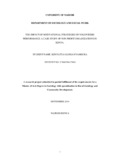| dc.description.abstract | Volunteers play a significant role in the achievement of the goals and objectives of the
non-profit organizations (voluntary organizations). However, these voluntary
organizations have focused more on their permanent employees (non-volunteers) in
terms of motivation for productivity leaving behind volunteers, it has been widely
assumed that volunteers are intrinsically motivated considering the fact that they offer
their services voluntarily and therefore the presence or lack of any form of motivation
would not alter their performance (Fischer, 2003; Kreitner & Kinicki, 2007; Wright,
Larsen and Higgs, 1995).
The study sought to identify the motivational strategies in existence in the voluntary
organizations and their effect on volunteer performance; it further grouped the
strategies into intrinsic and extrinsic factors as categorized by Herzberg (1959) theory
to assist the study understand if both motivational and hygienic factors were
significant when it comes to volunteers performance and job satisfaction. The study
further used the Social Exchange Theory to establish whether volunteers engaged in
volunteer work expecting social rewards, and therefore the two had to strike a
balance.
Research was carried out in three voluntary organizations in Kenya they include the
Kenya Red Cross Society, the United Nations Volunteers and the St. Johns
Ambulance Kenya. The three voluntary organizations were selected due to the
availability of a high active volunteer base of more than 100 volunteers in Nairobi
which was the study area. A total of 120 respondents were sampled constituting 90
volunteers selected from the volunteer registers while a comparative study was done
with 30 non volunteers.
The study found out that the motivational strategies which had been grouped into
intrinsic and extrinsic factors existed in the voluntary organizations though they were
not conversant to all the volunteers and the non volunteers. The study also inferred
that volunteer performance was influenced by the motivational strategies with the
largest respondents of volunteers (44.4%) selecting strategies that were geared
towards their personal growth and development (intrinsic), while for non volunteers
the largest respondents (33.3%) selected organizational motivational strategies
(extrinsic) that created a conducive work environment. The study further revealed that
the motivational strategies determined both the volunteers’ and the non volunteers’
performance.
The study recommendations include customizing the motivational strategies by the
voluntary organizations to consider both intrinsic and extrinsic factors which play a
significant role in volunteers’ performance, dissemination and prioritization of the
motivational strategies by the voluntary organizations and the development of a legal
framework for volunteerism in Kenya. | en_US |

